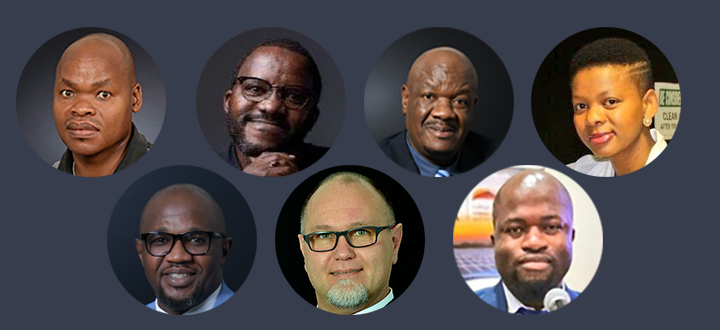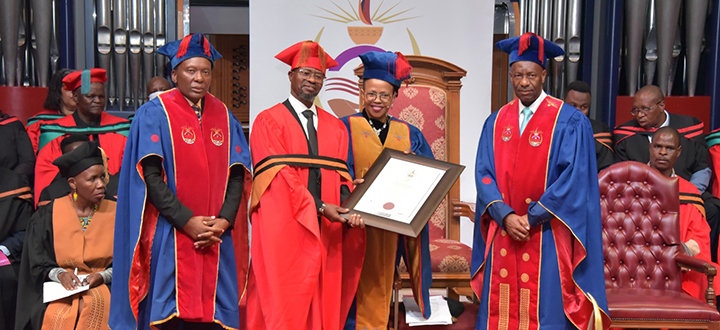College of Human Sciences
SA archives are without archives
Prof Mpho Ngoepe from the Department of Information Science in Unisa’s College of Human Sciences delivered his inaugural lecture this year entitled Archives without archives: a window of opportunity to build an inclusive archives in South Africa.
He began by citing the introductory lines of a 1968 classical novel by Matsepe, Megokgo ya bjoko (Tears of the Brain). “It states ‘we long to live yet we complain about life. We long to govern yet we complain about governing. We long for progress yet we complain about progressing’. These words resonate well with a cry from the archival community in South Africa.”

“Seventeen years later, Harris’ words still ring true as the status quo remains the same. The western way of understanding the archives continued to be given more space to develop in South Africa, while the indigenous way is not given even a sliver of attention. Where it is given attention, it is common to see archivists with tape recorders undertaking oral history projects in both random and structured modes, which is considered profoundly problematic in relation to voice and power.”
Furthermore, Professor Ngoepe said such projects cover only elite members of society perpetuating a notion that the stories that are worth telling and recording are for those in power. This is compounded by the fact that some provincial archives conduct disparate oral history projects each year that are not guided by national agenda or collection policy. Such projects are often conceptualised to meet the immediate needs.
“As things stand, the only archives of any note in South Africa are those of the various former colonies, the Boer republics and, after 1910, the Union Government of South Africa. Just like in Australia, the public domain has not been accommodating to indigenous models of knowledge production. As a result, users of these archives in South Africa are mainly what is referred to as an ‘old boys’ club’ comprising mainly male Afrikaner genealogical researchers. This is so because archival holdings in South African archives repositories do not reflect the diversity of the nation but mostly the interests of those who were previously in power. As a result, the users of such archives are mostly the beneficiaries of apartheid and colonial governments.”
Transforming archival system has been missed
Prof Ngoepe said with the dawn of democracy, the archival scene in South Africa was supposed to transform and reflect the diversity of the country, but it is still mainly the western-dominated global mainstream. “The cruel paradox in many revolutions is that what is left after the revolution resembles the past. In other words, the more things change, the more they remain the same. This has also been the case with the archival landscape in South Africa.”
One way of redressing this imbalance, he said, is through restructuring services at a local level closer to the people. “In South Africa, opportunity to transform the archival system has been presented in the past, but missed and continues to be missed by the archival communities. As a result, transformation is curtailed to skin colour by hiring more and more black people in the archives arena instead of transforming archival holdings and access.
“The only result of this was that fewer people make use of the archives repositories, as the holdings do not reflect the diversity of South African cultures but only the interests of some, hence 20 years into democracy, we (South Africans) are struggling to come to terms with the past as a result the past has reckoned with us.”
Prof Ngoepe said, public archives in South Africa have been unable to transform themselves into active documenters of society and thereby fail to fulfil their mandate of collecting non-public records with enduring value of national significance and to document aspects of the nation’s experience neglected by archives repositories in the past.
“This mandate positions archives to play an important role in redress, transformation and knowledge production. One way of redressing the situation is through capturing of oral history that is relevant to the ordinary people. However, documentation of history of marginalised communities is almost non-existent and in cases where it does exist, it has many inaccuracies as it is recorded from the coloniser’s perspective or in a problematic way.”
Archives reflect white privilege
He said in 2001, the South African government introduced the National Oral History Programme (NOHP), and the Oral History Association of South Africa (OHASA) was established in 2003, as well as the National Register of Oral Sources (NAROS). These were meant to fill the gaps in archival institutions that were brought about by colonisation and apartheid by offering alternative narrative.
“The programme was aimed at transforming the holdings of archival institutions. However, the degree to which the intentions of bridging the gaps has been met is a matter of debate, as the products of the project are not accessible to the citizen. Some of the tapes emanating from the project are stored in the boxes at the National Film, Video and Sound Archives (NFVSA), a subsidiary of the National Archives and Records Service of South Africa (NARSSA). Eventually these tapes would be obsolete and unreadable. As a result, all the efforts of producing such records would be in vain.”
Prof Ngoepe said that the current archival records preserved in South Africa’s mainstream archives largely consist of documents that were generated after the arrival of the Europeans in this part of the world. These records, which are stored in archival repositories, mostly in paper and microfilm formats, reflect very little about the indigenous communities.
“Therefore, it is important that the lives of ordinary people should be documented. This will also help to close the gap that exists in terms of archival holdings in public archival repositories, which reflect mostly white privilege. Oral source is an important part of recreation and rethinking of the past, especially to those who had never had an opportunity in the past.
“This study presents how archives repositories in South Africa can utilise a window of opportunity offered by newly established ‘empty archives’ to build inclusive archival holdings that reflect the diversity of South Africa as a rainbow nation. This in turn will help the repositories that are currently under-utilised to attract a new set of user.”
One way of building an inclusive archive, said Professor Ngoepe, is through embarking on a national oral history project that adopts the model of the Truth and Reconciliation Commission. Furthermore, the South African government should consider developing a policy on inter-repository repatriation of archives to the communities about which they were created. “Failure to address the situation of ‘archives without archives’ will render these repositories white elephants and empty vessels.”
Click here for a full copy of the lecture.
* Compiled by Rivonia Naidu-Hoffmeester (CHS communications and marketing)
Publish date: 2017-12-01 00:00:00.0

 Young Unisa doctoral graduate joins elite Lindau Nobel Laureate group
Young Unisa doctoral graduate joins elite Lindau Nobel Laureate group
 Education MEC addresses Unisa autism seminar
Education MEC addresses Unisa autism seminar
 Seven Unisans nominated for the NSTF-South32 Awards 2023/2024
Seven Unisans nominated for the NSTF-South32 Awards 2023/2024
 Unisa awards posthumous honorary doctorate to literary maven, OK Matsepe
Unisa awards posthumous honorary doctorate to literary maven, OK Matsepe
 From humble beginnings to academic leadership
From humble beginnings to academic leadership